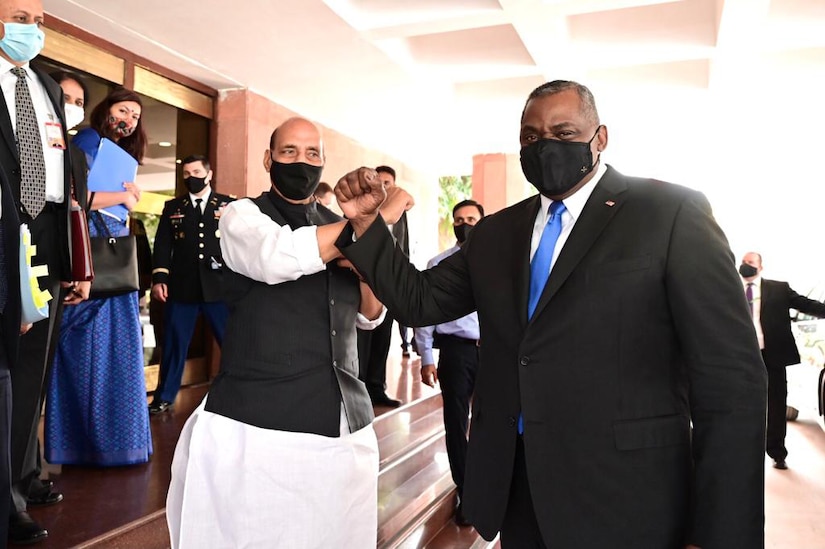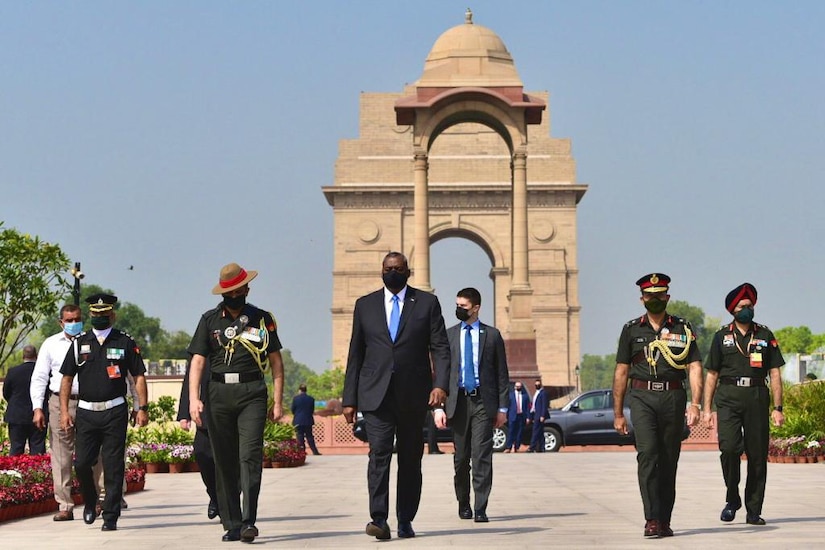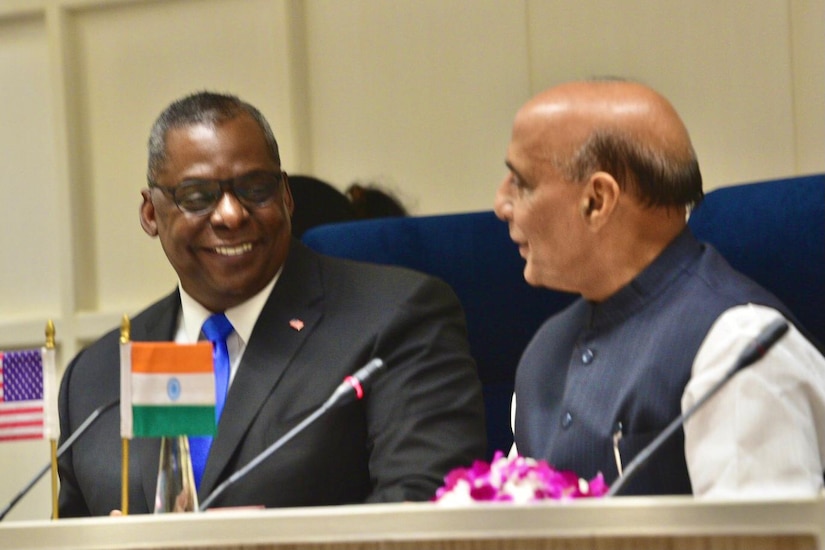March 20, 2021
STAFF: Good afternoon, ladies and gentlemen. His excellency Lloyd James Austin, Secretary of Defense for the United States of America. His excellency Raksha Mantri Shri Rajnath Singh, Defense Minister of India. Delegation members from both countries. (Inaudible) and the media.
As you are aware, our two delegations have just concluded their talks on defense cooperation. In this regard I would like to invite first his excellency Rajnath Singh to (inaudible)
(UNTRANSLATED)
RAKSHA MANTRI SHRI RAJNATH SINGH, INDIAN DEFENSE MINISTER: Thank you. I would like to read my initial statement in English.
Excellency Secretary Austin, ladies and gentleman, it is great honor and pleasure to receive U.S. Secretary of Defense, Mr. Austin, in his first official visit abroad and to India.
I just spoke with Secretary Austin immediately after he assumed charge. We had an excellent conversation during which I invited him to visit India at his earliest convenience. His visit to India, despite the COVID-19 global pandemic, shows the abiding commitment of the United States to our bilateral relationship.
I am happy to inform that we had a comprehensive and fruitful discussion with Secretary Austin and his delegation. We are keen to work together to realize the full potential of the India-U.S. Comprehensive Global Strategic Partnership.
Our discussions today focused on our wide ranging defense cooperation and expanding military-to-military engagement across services, information sharing, cooperation in emerging sectors of defense, and mutual logistics support.
We reviewed the wide gamut of bilateral and multilateral exercises and agreed to pursue enhanced cooperation with the U.S. Indo-Pacific Command, Central Command and Africa Command. Acknowledging that we have in place the foundational agreements, LEMOA, COMCASA, and BECA, we discussed the steps to be taken to realize their full potential for mutual benefit.
I conveyed my appreciation to Secretary Austin for participation of U.S. in Aero India 2021 along with a business delegation. I invited U.S. industry to take advantage of India's liberalized foreign direct investment policies in the defense sector. We both agreed that there are opportunities for collaboration in defense industry.
The recent Leaders' Summit of India, USA, Japan, and Australia under the Quad framework emphasized our resolve to maintain a free, open, and inclusive Indo-Pacific region. We discussed the need for enhanced capacity building to address some of the non-traditional challenges such as oil spills and environment disasters, drug trafficking, illegal, unreported, and unregulated fishing, et cetera.
India is committed to further consolidate our robust defense partnership with the United States. I look forward to working with you, Excellency, closely to make the India-U.S. relationship one of the defining partnerships of 21st century.
Thank you very much.
STAFF: Thank you, sir. Now I express Secretary Austin to make his statement.
SECRETARY OF DEFENSE LLOYD J. AUSTIN III: Well, unfortunately, I can only provide my comments in English.
(Laughter.)
Well, thanks to everyone for coming. And first and foremost, I'd like to express my deepest condolences for the tragic accident that killed an Indian Air Force pilot earlier this week. Our hearts go out to his family and friends and his death reminds us of a risk that our brave servicemen and women take each of these days to defend our democracies, our people, and our way of life.
Today I want to thank Minister Singh for the warm welcome and the deepest thanks -- my deepest thanks go out to the people of India for their gracious hospitality.
It is indeed a privilege to be here at New Delhi on my first overseas trip as Secretary of Defense. And I'm grateful for the opportunity to meet with my counterpart, despite the challenges from COVID-19.
I'm pleased to report that Minister Singh and I had a very productive discussion, as you've heard, on a number of security interests that are important to our two countries. And at the top of my agenda, I want to convey the Biden-Harris administration's message of our strong commitment to our allies and partners.
India, in particular, is an increasingly important partner among today's rapidly shifting international dynamics. And I reaffirmed our commitment to a comprehensive and forward-looking defense partnership with India as a central pillar of our approach to the region.
As the world faces a global pandemic and growing challenges through an open and stable international system, the U.S. and India relationship is a stronghold of a free and open Indo-Pacific region.
Prime Minister Modi has stated that India stands for freedom of navigation and freedom of overflight, unimpeded, lawful commerce, and inherence to international law.
So this is a resounding affirmation of our shared vision for regional security in the Indo-Pacific. And it's clear that the importance of this partnership and its impact to the international rules-based order will only grow in the years ahead.
Our work today is grounded in our shared values and converging strategic interests. We discussed opportunities to elevate the U.S.-India major defense partnership, which is a priority of the Biden-Harris administration. And we'll do that through regional security cooperation and military-to-military interactions and defense trade.
In addition, we are continuing to advance new areas of collaboration, including information sharing and logistics, and artificial intelligence, and cooperation in new domains such as space and cyber. We also discussed engagement with like-minded partners through multilateral groupings such as the Quad and ASEAN.
And as the Indo-Pacific region faces acute transnational challenges, such as climate changes and challenges to a free and open regional border, cooperation among like-minded countries is imperative to securing our shared vision for the future.
Despite today's challenging security environment, the partnership between the United States and India, the world's two largest democracies, remains resilient and strong. And we will seek every opportunity to build upon this major partnership.
Thanks again to Minister Singh for your warm hospitality and for your strong leadership as we continue to deepen our cooperation and advance our shared interests and values and defend the international rules-based order.
I look forward to working with you in the years ahead and I'm confident that together we can build a partnership that's fit for today's and tomorrow's challenges.
Thank you very much, sir.
STAFF: Thank you very much, sir.










